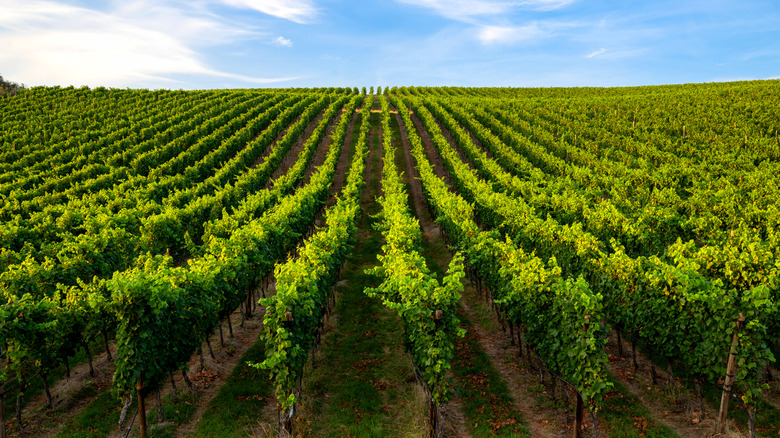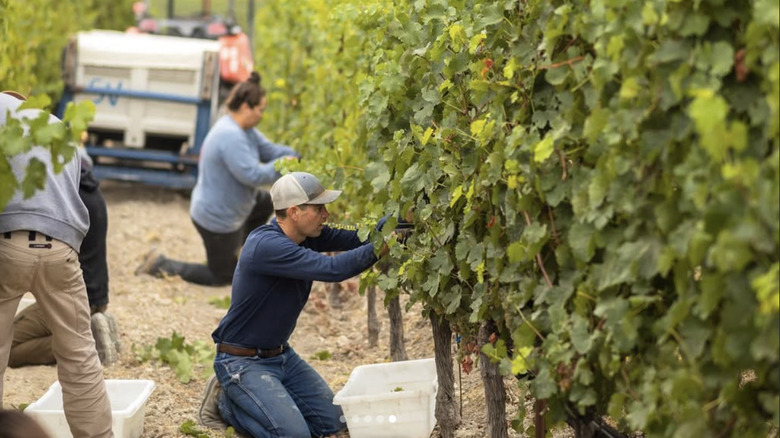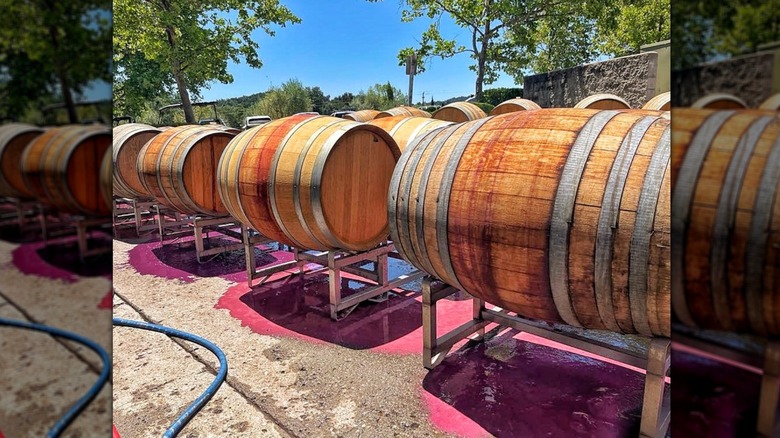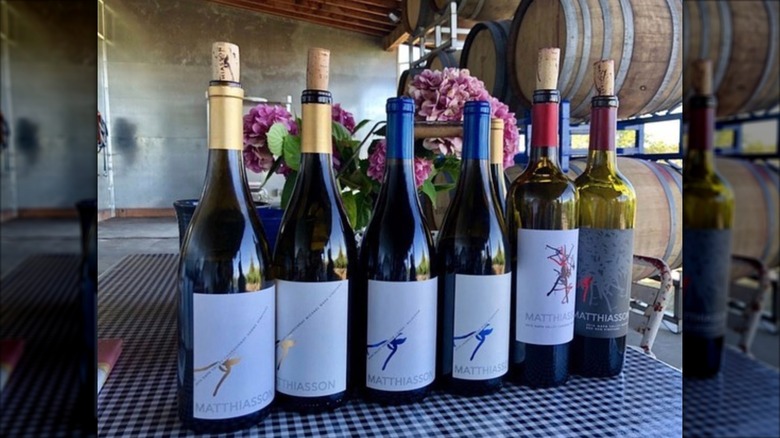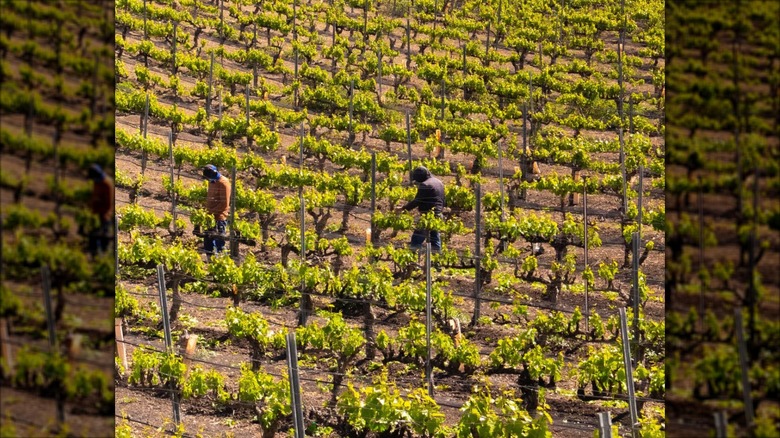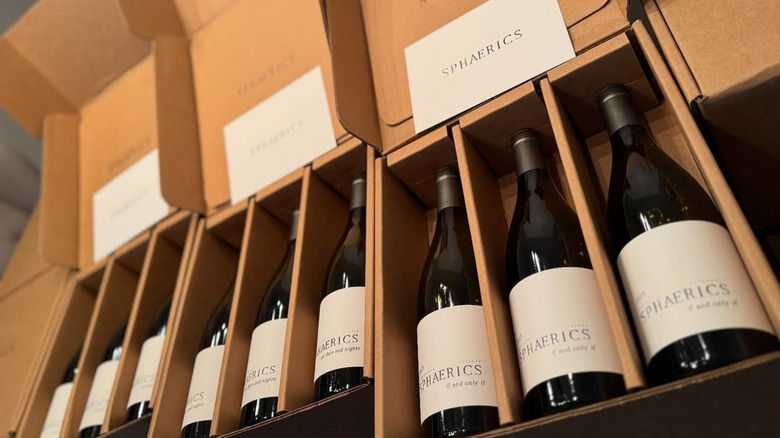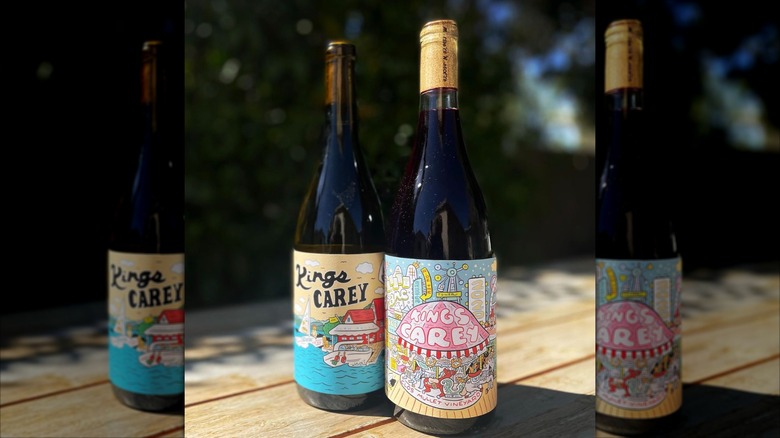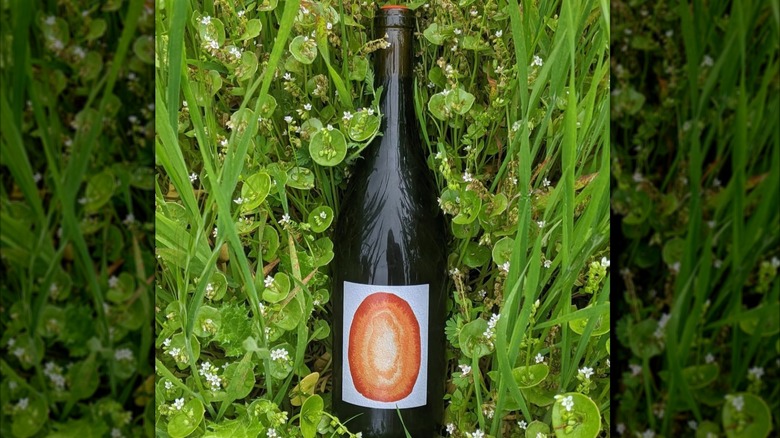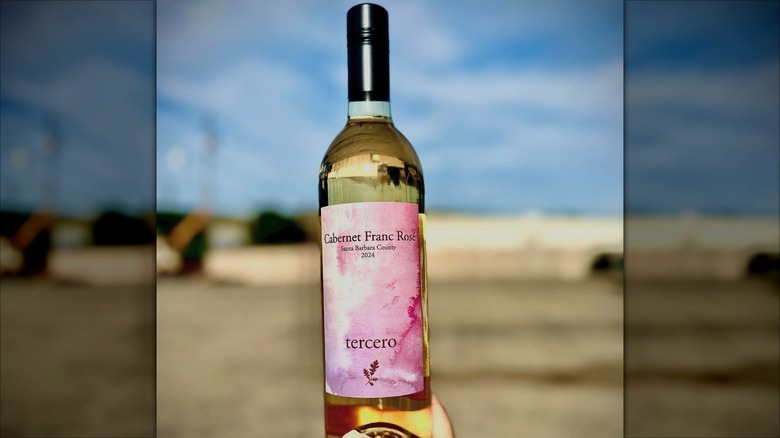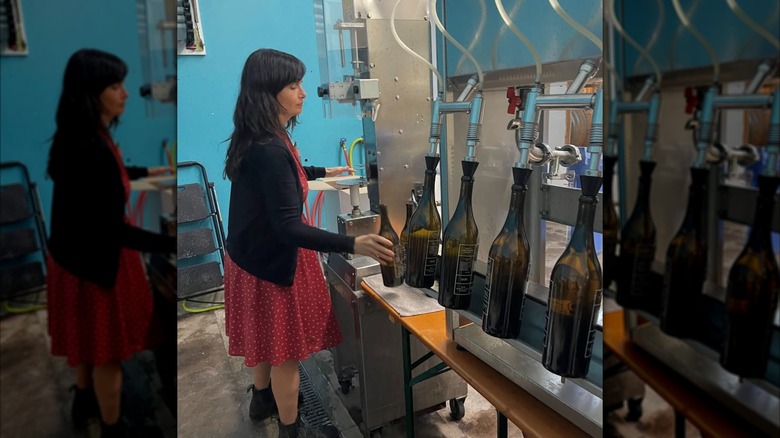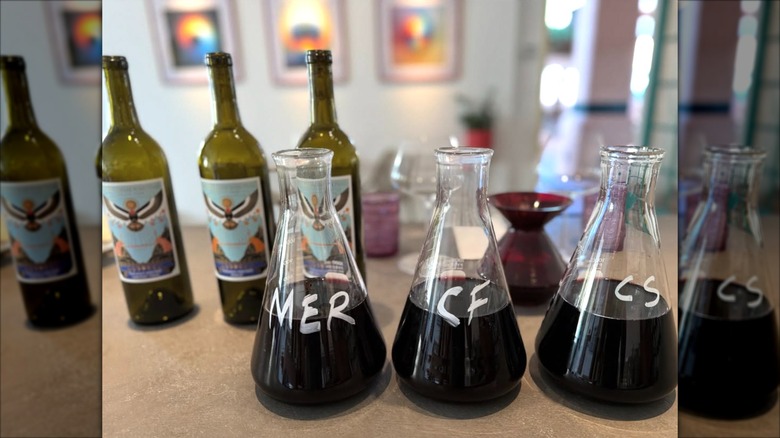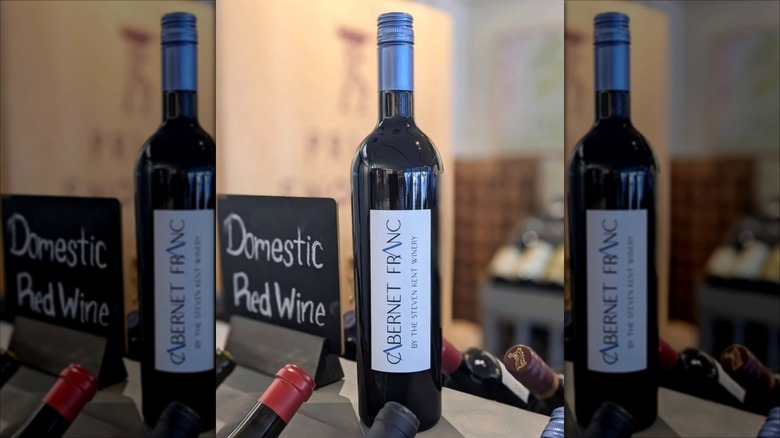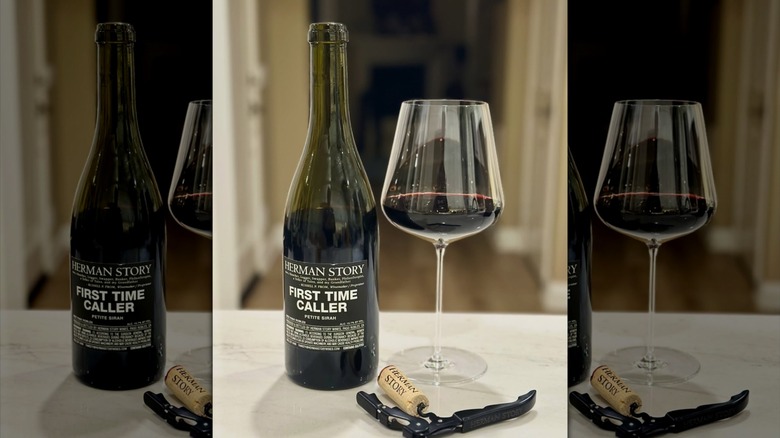Hidden Gem Wineries In California You Need To Visit
Wine seems simple. Grapes go in, wine comes out. But it's way more complex than it looks, and you'd be shocked to learn how many grapes it takes to make a bottle of wine. For most people, the hardest part isn't drinking wine (that's actually relatively easy), it's knowing where to start: what style you'll like, which wine to pair with your food, what's actually worth opening, and what to do if it's not what you expected. And yes, there is a right way to send a bottle of wine back without being a jerk.
Even if you don't know much about wine yet — maybe you're still asking your local wine shop owner what wine to buy — there's still plenty of value in exploring California's wine scene. There's much more to the Golden State's wineries beyond the obvious names everyone already knows. California isn't just Napa; it's huge, diverse, and packed with smaller wineries quietly making world-class bottles without spending millions on marketing.
So, we asked three experts — Nikki Djafarian, sommelier at Kettner Exchange; Matthew J. Kaner, sommelier and wine consultant; and Chris Lucchese, the sommelier at LA's Wife and the Somm — to tell us which hidden gem wineries people should have on their radar. Find them now, before they become the big names everyone suddenly claims they always knew about.
L'Aventure Winery
When French winemaker Stephan Asseo left Bordeaux in the late '90s, he wasn't trying to escape wine; he was trying to escape the rules. After years in France's strict AOC (Appellation d'Origine Contrôlée) system, he wanted more freedom. He searched South Africa, Lebanon, and Napa before ultimately landing in Paso Robles, where he founded L'Aventure in 1998. Today, the winery is known for blending estate-grown Rhône, and Bordeaux varieties in a way that celebrates Paso's terroir.
This is exactly the kind of winery sommelier Nikki Djafarian claims is often overlooked, because it isn't a mass-market, high-volume, heavily marketed brand. "I believe there are a multitude of reasons that keep some wineries hidden, some being the wineries' choice due to limited production, and some being the lack of marketing, but the latter is more common in my opinion," she explains. "The focus is more on craftsmanship."
Today, L'Aventure ages its wine in underground caves. It remains family-run, and continues to innovate over 25 years after its founding, blending French roots with Paso Robles' identity. If you want to experience it firsthand, the winery offers intimate, reservation-only tastings daily from 10 a.m. to 4 p.m. You can choose from a Discovery Flight on its covered patio overlooking the vineyard, a Library Flight in a private cave room featuring older vintages, or a Champagne Flight that delves into its partnership with the Thiénot family. Each tasting is guided by a dedicated Estate Educator.
Tablas Creek Vineyard
One of Nikki Djafarian's top choices for a hidden gem winery is Tablas Creek Vineyard. Founded in 1989 as a partnership between two winemaking families, Tablas Creek began with a mission to craft Rhône-style wines in California. It imported vine cuttings directly from France, built its own nursery to propagate them, and planted west of Paso Robles for the Mediterranean-esque climate. It has been certified organic since 2003, certified biodynamic since 2017, and is the world's first Regenerative Organic Certified Gold vineyard.
For Djafarian, this is exactly what makes a hidden gem winery worth seeking out. "You can really taste the difference in elegance and complexity at these hidden gems that, personally, I don't think the big guys can pull off naturally," she says. These are wines defined by the vineyard first, not additives, shortcuts, or volume target. "There's something timeless about the idea of a hidden gem," says Djafarian. "The real connection to wine often happens off the beaten path, in the small vineyards, with the people quietly perfecting their craft."
Tablas Creek offers seated flight tastings indoors, and on its terraced patio. There is also a premium Legacy Tasting for $75 per person that includes current, and library releases of its flagship blends. Vineyard and cellar tours, where you can walk the Regenerative Organic Certified estate, and finish with a tasting, are hosted daily at 10 a.m. Walk-ins are accommodated if there is space, but reservations are recommended.
Matthiasson Wines
When asked which bottle from a hidden gem recently impressed her, Nikki Djafarian immediately pointed to the 2022 Matthiasson Cabernet Franc, a wine she says drinks more like a Loire Valley Chinon than the big, bold, heavy Cabernet Francs most people expect from Napa. "Great structure, elegantly balanced, with just the right amount of acid to pair with food," she describes before adding: "Their Rosé is also one of my go-tos for any occasion."
The winery's owners, Jill and Steve Matthiasson, emerged from the sustainable agriculture movement, and founded the winery in 2003 with a philosophy rooted in purity, place, responsibility, and organic farming. The winery has no outside partners or investors, and this independence allows it to farm its vineyards organically, tailoring the process to the terroir instead of forcing flavor.
Matthiasson produces a range of classical wines, from familiar favorites like Chardonnay, and Cabernet Sauvignon, to rarer finds such as Ribolla Gialla, and Refosco. Visitors can experience these wines firsthand at outdoor tastings overlooking Napa's Phoenix Vineyard, offered by appointment seven days a week. Tastings last approximately 75 minutes, and feature five to six wines, with the option to upgrade to a Reserve Tasting, which includes some of the winery's most sought-after selections, including single-vineyard Cabernets, and small-production releases.
Saarloos and Sons
Sommelier and wine consultant Matthew J. Kaner first met Keith Saarloos back in 2007, "before the world knew about [him] and his family." Many years later, Saarloos and Sons still fits Kaner's description of a hidden gem: "Hidden gems will often have the owner or winemaker more available to you. Enjoy the access while it lasts! Just keep in mind, they are the next famous winery in the making."
The Saarloos family seemingly takes pride in this distinction, purposely staying small, and out of the spotlight. The winery doesn't outsource, and isn't shy about how it operates. All farming, harvesting, crafting, pouring, and decision-making remains in-house. Saarloos and Sons doesn't even sell its wine in stores or restaurants; you have to order direct to try it.
Vineyard tours are free every Saturday morning, and led by Keith Saarloos himself. Each includes a walk through the estate, an in-depth overview of the production process, and stories about the farming family. Finish the morning in the tasting room, complete with a guided tasting of the wines you just saw in the vineyard.
Sphaerics Wine
Sommelier Matthew J. Kaner discovered Sphaerics in 2024, and says it's on its way to becoming a household name, due to the nature of the industry. "Hidden gems within California are harder and harder to keep hidden with the rise of social media," he says. "But some wineries just keep their head down and build, staying off the influencers' radar." Kaner's seen this pattern before, and says it's often perpetuated by assistant winemakers looking to make their mark on the industry. They work quietly on their passion projects until, as he puts it, "they explode onto the scene like an overnight success."
Sphaerics was founded in Napa in 2022 by a husband and wife team, Brian Ball and Laura Jones, who make Chardonnay with a level of precision that comes from real-world experience. Winemaker Jones honed her craft at Aubert and Domaine Armand Rousseau before starting this project. The winery focuses exclusively on Chardonnay from distinctive California sites, leaning into traditional winemaking, and meticulous detail to produce wines that aim to provide new reference points for the next generation of winemakers. If you want to visit, you'll need to plan ahead, as Sphaerics hosts private tastings by appointment only.
Kings Carey Wines
Kings Carey is a hidden gem in Santa Barbara that makes small-production wines. Its Sémillon, a white Bordeaux grape, is the bottle that most recently impressed sommelier Chris Lucchese from Wife and the Somm, a wine-forward restaurant and event space in Los Angeles. Sémillon is one of Lucchese's favorite grapes, and one that he says Kings Carey does beautifully.
Kings Carey is led by winemaker James Sparks, who initially went to the Santa Ynez Valley after leaving the Mormon church. Sparks cut his teeth at Dragonette Cellars before becoming the first dedicated winemaker for Liquid Farm. Now, at Kings Carey, he produces single-varietal, single-vineyard wines with minimal manipulation, adhering to simple techniques that allow the region to speak for itself without correction.
You can thank Sparks' philosophy, and his meticulous attention to detail, for the high quality of the wine at Kings Carey. This dedication is a great example of what Lucchese says sets hidden gem wineries apart from mass-market labels. He says, "They all make these amazing small production wines that aren't going to make them millionaires, but will bring joy to so many people!" Kings Carey offers tastings, and private visits to its Solvang space by appointment only.
Roark Wine Company
Ryan and Jenn Roark built their winemaking philosophy on keeping things as simple as possible, and not adding unnecessary steps. Their wines mostly feature grapes they've farmed themselves, or sourced from partners who share their minimalist beliefs, and they do not fine or filter them. The Roarks also use minimal amounts of sulfur to produce their lineup, which ranges from Syrah, and Pinot Noir, to Chardonnay, Zinfandel, and signature blends like Pocket Full of Stones, a combination of Chardonnay and Sauvignon Blanc meant to showcase the diverse region more than any single variety.
If you want a sense of how grounded, and hands-on this place really is, Chris Lucchese sums it up perfectly when he recalls: "A few years back, when we were visiting the Santa Ynez Valley, someone recommended visiting Ryan Roark, who rolled into the industrial center where his 'office' is in his work clothes, and his truck covered in dust from driving through the vineyard."
With this no-frills approach still in effect, Roark relocated the winery to just north of Los Olivos, on Foxen Canyon Road. Tastings are limited, and by appointment only, so email ahead if you want to check out some of these wines in person.
Tercero Wines
Winemaker Larry Schaffer works with grapes from nearly every AVA in the region. While he focuses on Rhône varieties, he also ventures into other styles such as Pinot Noir, Gewürztraminer, and Cabernet Franc.
After graduating from UC Davis, and working at other wineries, Schaffer decided to branch off, and finally leave his own mark on the industry with Tercero Wines. He uses no new oak, and instead ages his reds in French barrels that are 4 to over 15 years old, and his whites in 6-year-old barrels. But the thing that really sets this winery apart is how Schaffer makes his red wine. He uses 100% whole clusters, meaning that he ferments the grapes with the stems still attached, as he believes they add structure, extra layers of flavor, and complex aromas. He also personally stomps every lot with his feet to break up the fruit, enjoying the natural chaos that this adds to the winemaking process.
The Tercero tasting room sits right in Downtown Los Olivos, and it's open Thursday through Monday, from 11 a.m. to 5 p.m. Reservations are recommended. If you're into really getting into the nitty-gritty of winemaking, Schaffer will gladly explain the process in a way that's both technical, and totally approachable. He also gives tours, and tastings at the production facility where Tercero wines are made.
Angeleno Wine Company
Founded by Amy Luftig, and Jasper Dickson, Angeleno Wine Company is making exciting, small-lot wines from grapes grown entirely in LA County. Luftig came from a career in public policy before discovering that nothing made her happier than shoveling grapes, and cleaning barrels. Dickson, meanwhile, inherited his love of fermenting fruit from his father, a home winemaker. If hearing this inspires you to try winemaking at home yourself, you might be surprised to learn how easy it can be. Turning that hobby into a winery, though, is a different story.
Together, Luftig and Dickson source fruit from tiny, family-run sites across the county, from Rock Farms Vineyard to the century-old Lopez Vineyard planted in 1918. Their focus is on producing unique varieties such as Tannat, Graciano, Godello, Loureiro, Treixadura, and Alicante Bouschet.
Angeleno Wine Company is also a piece of living LA history. It's the first winery to open in Downtown Los Angeles since Prohibition, operating inside a 1925 brick building constructed from recycled bricks salvaged from the city's original City Hall. Its tasting room sits just steps from the site of LA's earliest vineyards, bringing winemaking back to where it first began. It's open Friday through Sunday, it's kid- and pet-friendly, and it encourages BYO snacks. Reservations are recommended.
Extradimensional Wine Co. Yeah!
Extradimensional Wine Co. Yeah! is a project by husband-and-wife team Hardy Wallace and Kate Graham. Wallace built a following during his years at Dirty & Rowdy winery, where he helped redefine what California Mourvèdre could be, and he brings that same spirit to Extradimensional. Graham, meanwhile, adds the vision, and work ethic that piloted two decades of social impact, and community work.
Extradimensional's lineup covers a lot of ground, from bright, aromatic Zinfandels, to vineyard-specific Brosseau Pinot, Chardonnay, Grenache, and (of course) the Mourvèdre that Wallace is known for. "[Hardy] made a super [Mourvèdre] with D&R, and continues with his new label, Extradimensional Wine Co. It's another grape we love to drink, and to sell," says Chris Lucchese when asked about a bottle that has impressed him recently. "He's been making some outstanding bottles for years and years!"
Today, Extradimensional Wine Co. Yeah! has a tasting room right on the Sonoma Plaza. It's bright, welcoming, and full of energy, just like the wines. Tastings run 90 minutes at the stand-up bar, reservations are recommended, and private events can be arranged by email.
Steven Kent Winery
Steven Kent Mirassou is a sixth-generation winemaker whose family has been making wine in the Livermore Valley for more than 150 years. Today, his work centers on making world-class, Bordeaux-style wines, particularly in the style of Loire Valley Cabernet Franc. These wines are aged in 100% French oak, but only 50–60% of that wood is new, so as to not overwhelm the fruit. And the blending happens early, so the varieties have plenty of time to marry into something more layered, and expressive.
If you're looking for what the region can really do with Cabernet Franc, Matthew Kaner says it best: "I recently had the 2024 Steven Kent Cabernet Franc Blanc during a press trip to Livermore Valley, which blew me away. I was unaware of how important Cabernet Franc is to the region, and was so damn impressed to see the handling of the variety by winery after winery. Steven Kent Mirassou is one of the few I've seen explore the blanc side of Cabernet Franc, making a dry white wine with no skin contact. It's a must to seek out." And if you've ever wondered what makes a wine dry, the answer is in the sugar levels, not the water content.
The tasting room at Steven Kent Winery offers a mix of educational flights, vintage wines, pours by the glass, and a more elevated Club Lounge experience for members, all overlooking rolling hills, and vineyards. Reservations are recommended.
Herman Story Winery
Herman Story is what happens when a winemaker decides that wine should be fun instead of stuffy. Russell P. From started the label in 2001 with seven barrels of Syrah, and two decades later, he's still making wine that feels less concerned with science, and more with having a good time. If you're interested in pairing your hot dogs with wine, this would definitely be a label to check out.
Like From himself, Herman Story's wines are full of personality, leaning hard into big, Rhône-inspired character. From makes them with fruit from more than 30 top-tier vineyards across seven growing regions, including estate sites in the York Mountain AVA. The Chelle Mountain Vineyard, which the winemaker took over in 2013, and later purchased, is his personal passion project, and home to his only estate-grown wine.
Herman Story's tasting room in Paso Robles is open seven days a week, and no reservations are required. Tastings run about 45 minutes, either outside at picnic tables, or inside the cellar, depending on the day. And while From pops in often, he might also be out in the vineyard, or on one of his many storied adventures.
